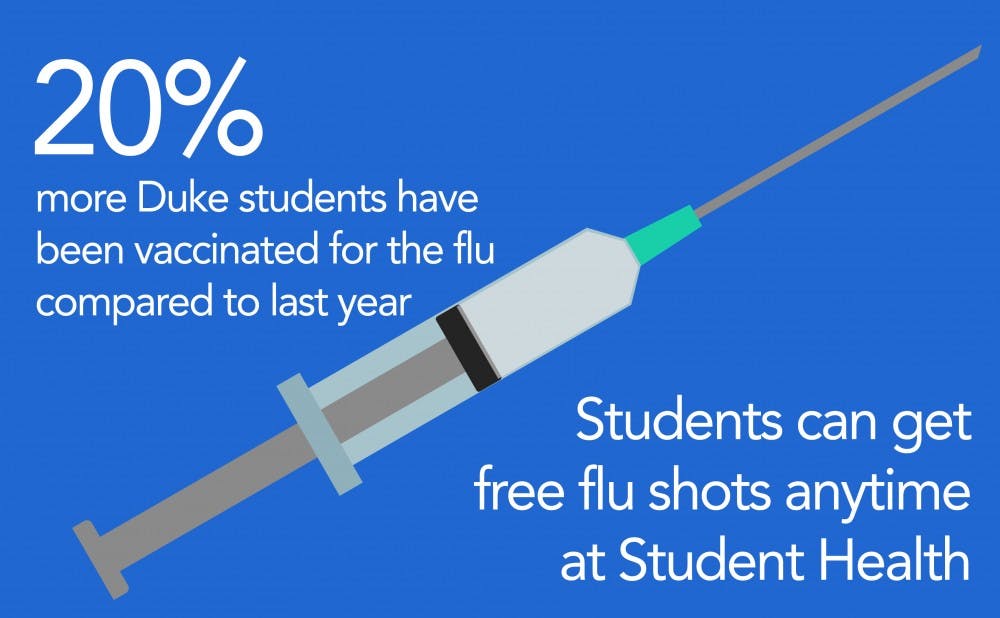Twenty percent more students have been vaccinated for influenza at Duke compared to the same time last year, according to one official.
More than 1,300 students were vaccinated during the "Bryan Center Blitz" flu vaccine clinic held Wednesday, John Vaughn, director of Student Health Services, wrote in an email. Student Health has been hosting flu clinics in order to increase the number of students, staff and faculty that get vaccinated. Vaughn wrote that these flu clinics have vaccinated 5,168 students as of Thursday morning.
The increase in vaccinations is in part due to the success of the flu vaccine clinics. Vaughn wrote that these have been helpful in increasing the number of students who get vaccinated.
“The vast majority of students get them at one of our flu shot clinics around campus,” Vaughn wrote.
At Duke, including those were vaccinated at the flu vaccine clinics, 6,352 students and 1,073 staff members have gotten the flu vaccine since Aug. 1.
If you haven’t gotten your flu shot yet, don’t worry—students can get a free flu shot anytime at Student Health. Students can make an appointment by phone or through MyChart or walk in before 3:30 p.m.
“We offer students a flu shot at every visit, regardless of what they come in for, and I’d say most students take us up on the offer,” Vaughn wrote.
The vaccines are funded by the Student Health budget which comes from the Student Health Fee.
In addition to students, staff, faculty and dependents are also covered to receive seasonal flu vaccines under an employee's Duke health plan. They can visit Employee Occupational Health and Wellness without an appointment. Duke has been hosting clinics to vaccinate these individuals as well.
Wednesday, the North Carolina Department of Health and Human Services' Division of Public Health reported the first confirmed case of flu death for the 2018-2019 season.
“Flu is always a serious illness, and in some cases can lead to complications and result in death, which is why we strongly encourage people to get vaccinated early and annually,” State Epidemiologist Zack Moore said in a news release.
Officials stated that the number of flu cases is higher than the same period last year. In North Carolina, last year was the deadliest flu seasons since adult flu deaths became reportable in 2009. The state reported a total of 391 deaths.
“Flu activity in the U.S. is low now, but expected to pick up in the coming weeks,” the Centers for Disease Control and Prevention reported on its website.
According to CDC data, as of Oct. 19, there have been 140.7 million doses of this season's flu vaccine given out nationwide.
Vaccines not only protect individuals, but communities as well. This concept is called herd immunity—the more people that are vaccinated in a community, the fewer people a virus can infect.
Last year, sophomore Marley Kaplan was originally unable to get the flu shot early in the season due to asthma attacks that she was having. She noted that she got one eventually.
“People should get the flu shot, because it's not about protecting themselves. It’s about protecting others who can’t get the flu shot,” said Kaplan.
In North Carolina last year, the majority of flu deaths were among individuals past the age of 65. Flu season lasts from late fall to early spring, with peak illness in January and February.
Get The Chronicle straight to your inbox
Signup for our weekly newsletter. Cancel at any time.

